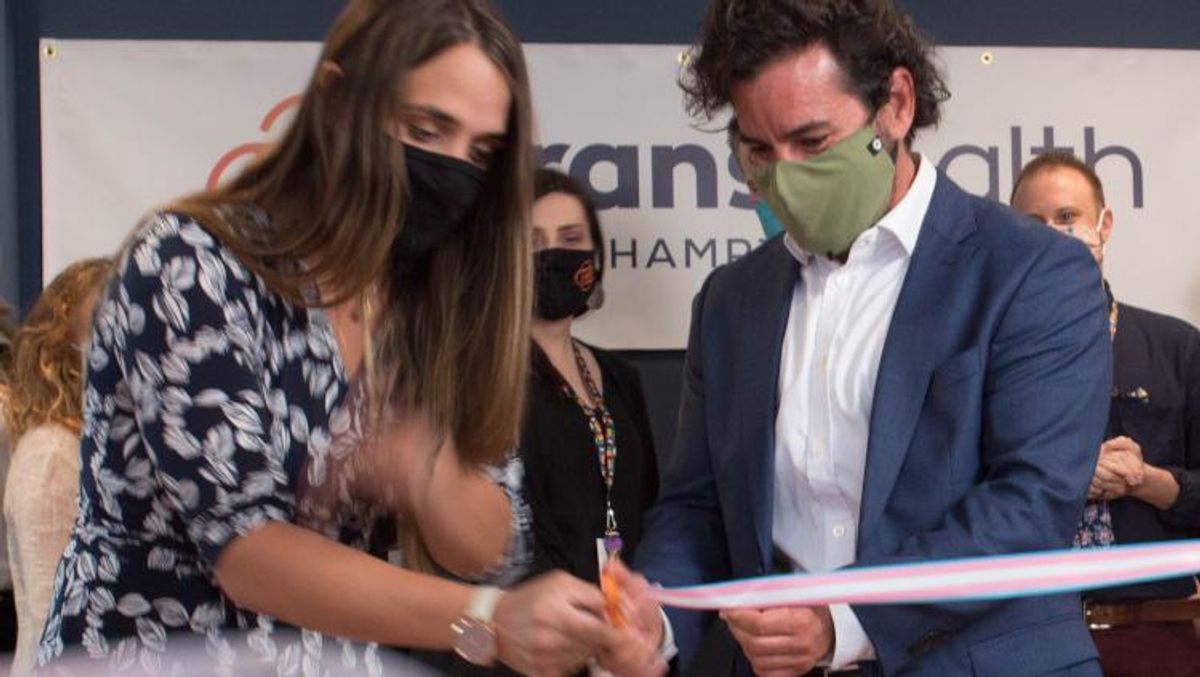Print Issue
A Health Center for Trans People, by Trans People

Photo by Rebecca Jones
A brand new, first-of-its-kind health center meets the specific needs of transgender folx, including those living with HIV.
July 15 2021 10:04 AM EST
By continuing to use our site, you agree to our Privacy Policy and Terms of Use.

A brand new, first-of-its-kind health center meets the specific needs of transgender folx, including those living with HIV.
As politicians across the country introduced and passed bills attacking transgender people — restricting their right to use public restrooms and their ability to play school sports, or establishing limits on what health care services trans youth can obtain — a small but revolutionary thing happened. The nation’s first independent comprehensive trans health care center opened, expanding access to gender-affirming care, including hormones, mental health services, primary and pediatric care, and HIV treatment.
Transhealth Northampton officially opened May 4 in western Massachusetts, far from population centers like Boston or Albany. While some may assume that finding gender-affirming care would not be a problem in a state like Massachusetts, Transhealth Northampton CEO Dallas Ducar says that’s not the case.
Respondents to a 2020 study from the Fenway Institute, Cooley Dickinson Hospital, and Harvard Medical School found local trans residents reported a “lack of provider availability and competency,” Ducar tells Plus. Respondents also noted a “lack of clinical skill and a desperate need for pediatric and mental health services and sexual and reproductive health.”
Ducar, who is trans, said she would often commute hours to find gender-affirming doctors — and many people do not have the financial resources or work flexibility for such care.
“Being able to find and have access to health care providers who affirm one’s identities and experiences is critical to the health and well-being of trans and gender-diverse people,” Brooke Stott, project manager at Transhealth Northampton, says in a statement. “Our team is committed to being community-led and ensuring that patients have a health care experience that celebrates and empowers them.”
Gender-affirming care may be hard to explain to cisgender, or nontrans, people, but it’s a very easy thing for gender-diverse folks to recognize, Ducar says.
“We’re really focusing on caring for someone and their relationship to their gender,” she says. “It’s synonymous with patient-centered care. Someone’s gender really impacts many, many different parts of their life. Where you use the bathroom, where you sometimes go to school, how you receive your health care, how you are referred to in public, what it’s like to go through an airport scanner. All these different parts of society are situated in the context of someone’s gender.” While gender-affirming care is not new to many mainstream health centers in big cities, Ducar says programs geared toward trans patients are usually the first things cut in a budget crunch. Gender-diverse patients will always be the first priority at Transhealth Northampton, according to the CEO.
“[We’re] reshaping health care that is responsive to one’s identity,” she says. “Reallyrestoring the humanity to health care. We’re guided by civil rights movements and really saying we are here to serve you; we are here to help you become the person you want to be. It’s not just about names and pronouns, but knowing your values, your goals.”
The staff of Transhealth Northampton reflects their patients, with the staff being majority transgender and predominantly LGBTQ+. Ducar said having gender-diverse employees can create spaces where patients can act authentically and speak frankly about their needs.
Comfort is also an important aspect of Transhealth Northampton’s HIV services, a vital aspect of the center’s services. Trans people continue to be disproportionately affected by the virus — a recent study by the Centers for Disease Control and Prevention found that 42 percent of transgender women in seven major U.S. cities reported living with HIV.
“We have a fabulous nurse care coordinator,” Ducar says. “Along with assessments and being there to help you navigate the health care system in general, she’s there to help you navigate these insurance and pharmacy logistical problems. We have primary care and mental care as well, so for HIV-positive patients, we will also have people who are very skilled in caring for many different populations, prescribing PeP and PrEP, doing assessments that are really based on informed consent and trauma-informed.” Mental health services will also be available for newly diagnosed and long-term survivors.
Advocacy is also a hallmark of Transhealth Northampton, Ducar says. That includes everything from pressing insurance providers to cover more gender-affirming care to lobbying politicians to stop using trans people, especially vulnerable trans youth, as political scapegoats.
“These medical bans [on gender-affirming care for trans youth] really should be considered as advancing genocide,” Ducar says. “I view this as an attack on American liberty and American freedom. Kids are still going to get their hormones. Banning this does not work. We saw this with the war on drugs. [These bills create] suicidal ideation. It’s time for folks to call it like it is. We all deserve a right to self-identify.”
While Ducar is disappointed and angry at the fact that “trans people have constantly been locked out of American society,” she sees her health center as a huge advance amid all the darkness. As she puts it: “We’ll be a bright light.”